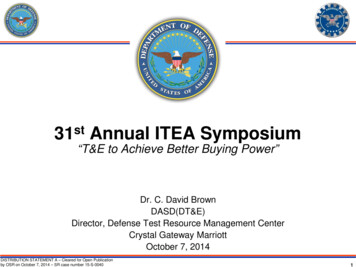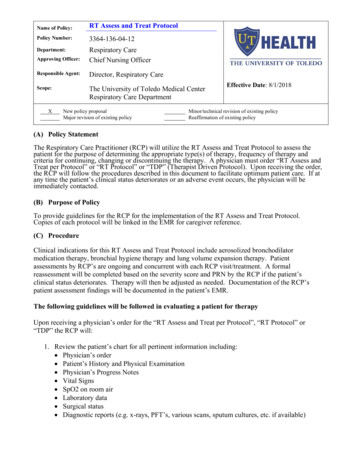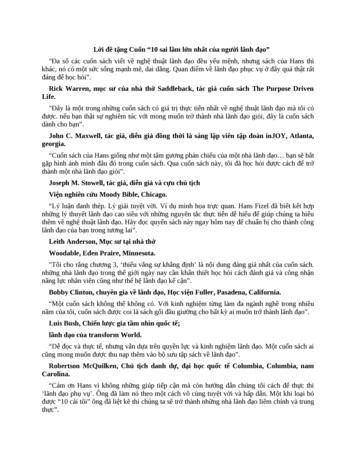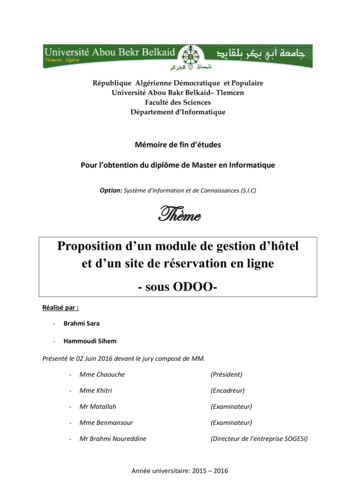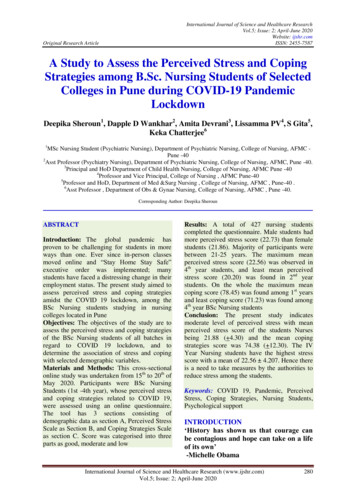
Transcription
International Journal of Science and Healthcare ResearchVol.5; Issue: 2; April-June 2020Website: ijshr.comISSN: 2455-7587Original Research ArticleA Study to Assess the Perceived Stress and CopingStrategies among B.Sc. Nursing Students of SelectedColleges in Pune during COVID-19 PandemicLockdownDeepika Sheroun1, Dapple D Wankhar2, Amita Devrani3, Lissamma PV4, S Gita5,Keka Chatterjee61MSc Nursing Student (Psychiatric Nursing), Department of Psychiatric Nursing, College of Nursing, AFMC Pune -402Asst Professor (Psychiatry Nursing), Department of Psychiatric Nursing, College of Nursing, AFMC, Pune -40.3Principal and HoD Department of Child Health Nursing, College of Nursing, AFMC Pune -404Professor and Vice Principal, College of Nursing , AFMC Pune-405Professor and HoD, Department of Med &Surg Nursing , College of Nursing, AFMC , Pune-40 .6Asst Professor , Department of Obs & Gynae Nursing, College of Nursing, AFMC , Pune -40.Corresponding Author: Deepika SherounABSTRACTIntroduction: The global pandemic hasproven to be challenging for students in moreways than one. Ever since in-person classesmoved online and “Stay Home Stay Safe”executive order was implemented; manystudents have faced a distressing change in theiremployment status. The present study aimed toassess perceived stress and coping strategiesamidst the COVID 19 lockdown, among theBSc Nursing students studying in nursingcolleges located in PuneObjectives: The objectives of the study are toassess the perceived stress and coping strategiesof the BSc Nursing students of all batches inregard to COVID 19 lockdown, and todetermine the association of stress and copingwith selected demographic variables.Materials and Methods: This cross-sectionalonline study was undertaken from 15th to 20th ofMay 2020. Participants were BSc NursingStudents (1st -4th year), whose perceived stressand coping strategies related to COVID 19,were assessed using an online questionnaire.The tool has 3 sections consisting ofdemographic data as section A, Perceived StressScale as Section B, and Coping Strategies Scaleas section C. Score was categorised into threeparts as good, moderate and lowResults: A total of 427 nursing studentscompleted the questionnaire. Male students hadmore perceived stress score (22.73) than femalestudents (21.86). Majority of participants werebetween 21-25 years. The maximum meanperceived stress score (22.56) was observed in4th year students, and least mean perceivedstress score (20.20) was found in 2nd yearstudents. On the whole the maximum meancoping score (78.45) was found among 1st yearsand least coping score (71.23) was found among4th year BSc Nursing studentsConclusion: The present study indicatesmoderate level of perceived stress with meanperceived stress score of the students Nursesbeing 21.88 ( 4.30) and the mean copingstrategies score was 74.38 ( 12.30). The IVYear Nursing students have the highest stressscore with a mean of 22.56 4.207. Hence thereis a need to take measures by the authorities toreduce stress among the students.Keywords: COVID 19, Pandemic, PerceivedStress, Coping Strategies, Nursing Students,Psychological supportINTRODUCTION‘History has shown us that courage canbe contagious and hope can take on a lifeof its own’-Michelle ObamaInternational Journal of Science and Healthcare Research (www.ijshr.com)Vol.5; Issue: 2; April-June 2020280
Deepika Sheroun et.al. A study to assess the perceived stress and coping strategies among B.Sc. nursingstudents of selected colleges in Pune during COVID-19 pandemic lockdownThe world has seen outbreaks ofepidemics and pandemic since prehistorictimes - 5000 BC China , 430 BC Plague ofAthens , AD 165-180 Antonine Plague , TheBlack Death 1346-1353 Asia to Europe ,American Plague 16th century , to thepresent age like Great Plague of London1665-1666 , Great Plague of Marseille1720-1723 , Philadelphia yellow feverepidemic 1793 , Spanish Flu 1918-1920 ,Asian Flu: 1957-1958 , SARS pandemic2003 , H1N1 Swine Flu pandemic: 20092010 , West African Ebola epidemic: 20142016 , Zika Virus epidemic: 2015-presentday. [1] Covid Pandemic, which is currentlyaffecting the world with its origin in Wuhan,China started in Dec 2019. Affecting nearlyall the countries in the world it is a historichealth emergency condition the world hasever seen which is even worse than worldwar II.The rate of contagion and patterns oftransmission is threatening the wholemankind.Pandemic is the outbreak of a disease thatoccurs over a wide geographic area andaffects an exceptionally high proportion ofthe population: a pandemic outbreak of adisease. [2]The occurrence of Pandemic hadincreased over the last years with globalwarming, urbanization, globalization, andexploitation of natural resources. With theprevious epidemic and pandemic, theInternational Health Regulation and WHsOprepared to meet specific standards fordetecting, reporting on, and responding tooutbreaks. [3] Despite these improvements,significant gaps and challenges exist inglobal pandemic preparedness. Pandemicsnot only impact the mortality morbidity butalso stagger the economic growth, delaysdevelopment. There is social disruption,political tension and individual behaviouralchanges, such as fear-induced aversion toworkplaces and other public gatheringplaces. [4] Pandemic affects the mentalhealth of individual as a total result.Pandemics like COVID 19, affectsthe mental health due to numerous reasons –Uncertainty, poor prognosis, economic loss,insecurity, confusion, emotional isolation,stigma, school/work closure, inadequateresources for medical response, anddeficient distribution of necessities. As aresult people experience a lot of emotionaldisturbances such as stress, insomnia,frustration, irritability which could lead topsychiatric disorders like depression,anxiety, behavioural changes (substanceabuse), also post-traumatic stress disorder inlater stages. [5] Some groups may be morevulnerable than others to the psychosocialeffects of pandemics. In particular, peoplewho contract the disease, those atheightened risk for it (including the elderly,people with compromised immune function,and those living or receiving care incongregate settings), and people with preexisting medical, psychiatric, or substanceuse problems are at increased risk foradverse psychosocial outcomes. [6]The psychological issue can worsenwith social distancing and the lockdownmeasures taken by administrations asobserved in many countries worldwide.Limacaoco et al (Apr 2020) In adescriptive study titled Anxiety, worry andperceived stress in the world due to theCOVID-19 pandemic, March 2020 whichwas conducted in 41 countries, revealed thatsignificant higher scores of perceived stresswere observed among women, youth,students, and among those who expressedconcern and those who perceived increasedsusceptibility to the COVID-19. [7]Lee J in an article published inLancet (Apr 2020) explains the effects ofCOVID 19 pandemic on students. In asurvey, which included 2111 participants upto age 25 years with a mental illness historyin the UK, 83% said the pandemic had madetheir conditions worse, 26% said they wereunable to access mental health support; peersupport groups and face-to-face serviceshave been cancelled, and support by phoneor online can be challenging for some youngpeople. [8]According to India Today (07 Apr20) there are three major educationInternational Journal of Science and Healthcare Research (www.ijshr.com)Vol.5; Issue: 2; April-June 2020281
Deepika Sheroun et.al. A study to assess the perceived stress and coping strategies among B.Sc. nursingstudents of selected colleges in Pune during COVID-19 pandemic lockdownproblems that students and educatorscurrently face due to the Covid-19pandemic: 1. Students caught in the crosswire. These are those students who arecaught in the limbo on account of educationoutcomes being withheld due to the Covid19 pandemic. Some of them do not have aresult because exams either did not happenor were left in the middle. 2 .Students oneyear away from school or college-leavingexams. 3. Education disruption. In responseto the Covid-19 scare, many schools andcolleges have moved online and parentsseem to have assumed the role of teachers.Again, while there are a ton of fantasticresources which are available, there are nottoo many resources which mimic the schoolthat is, provide for multidisciplinarylearning, encourage connections acrossdifferent domains and inspire ideas whichhelp a child develop 21st century skills andprepare themselves for the jobs of thefuture. [9]A survey done was by Dartlet et al2020 (US) to assess the effect of COVID 19on college students. 4 in 5 students see theirinstitutes as trustworthy sources of COVID19 information. 4 in 5 students report havingto make large or drastic life changes toaccommodate the current COVID-19situation. Despite being digital natives, moststudents are not fully comfortable with anexclusive online learning medium. [10] Thusit is obvious that the covid 19 pandemic hasa negative impact on the student’s life.With the imposing stress of COVID19 on the students, the present study isfocused on the perceived stress by the BScnursing students . Previous studies from UKand India have revealed that nursingstudents face comparatively higher level ofstress as compared to their counterparts inother colleges. [11-12]Senturk et al (2018) in Turkeydetermined in a descriptive study done onthe nursing students that the level of stressfaced by them was above moderate level. [13]Therefore, dealing with the hecticstudent nursing life the drastic lifestylechanges imposed due to COVID 19pandemic can be very challenging. As thereis no current study done in India amongnursing student, the present study attemptsto explore the perceived stress and thecoping strategies utilized by the BSc nursingstudents in the COVID 19 pandemiclockdown.Title of the study: A study to assess theperceived stress and coping strategiesamong BSc Nursing students of selectedcolleges in Pune during covid 19 pandemiclockdown.Objectives:1. To assess the perceived stress of the BScNursing students of all batches in regardto covid 19 lockdown.2. To assess the coping strategies adoptedby the BSc Nursing students of allbatches in regard to covid 19 lockdown.3. To find the association of the perceivedstress level of the BSc Nursing studentswith selected socio demographicvariable.4. To find the association of Copingstrategies adopted by the BSc Nursingstudentswithselectedsociodemographic variable.Inclusion Criteria:1. All BSc Nursing students can participatein the survey2. Age should be 17-25 yrsExclusion Criteria:1. Participants residing in other cities thanPune city were not included in the study.Operational Definition:1. BSc Nursing Students: All studentsundergoing I , II, III , IV Basic BSc Nursingcourse in various Nursing colleges in Pune.2.Lockdown: Restrictions imposed on thegeneral public to remain indoors andmaintain social distancing with each other inthe outbreak of pandemic.3. Perceived Stress: Perceived stress is thefeelings or thoughts which the BSC Nursingstudents have about how much stress theyare since being under lockdown in the pastone month.International Journal of Science and Healthcare Research (www.ijshr.com)Vol.5; Issue: 2; April-June 2020282
Deepika Sheroun et.al. A study to assess the perceived stress and coping strategies among B.Sc. nursingstudents of selected colleges in Pune during COVID-19 pandemic lockdown4. Coping strategies: Coping strategiesrefer to the specific efforts, both behavioraland psychological, that the BSc Nursingstudents are employing to master, tolerate,reduce, or minimize stressful events duringlockdown.MATERIALS AND METHODSDesign : Cross sectional Descriptive studyPopulation : College StudentsTarget population: BSc Nursing studentsAccessible population : BSc NursingStudents of various colleges in PuneSampling Method : Purposive samplingData collection tool : Online Questionnaireconsisting of 3 sectionsi) Sociodemographic dataii) Modified Perceived Stress Scaleiii) Modified Brief Coping Strategies Scalei) Sociodemographic Data :It conists of 10 questions – Gender , Age ,Year of study , Basic qualification ,Religion , Residing with family or in hostel ,Family status , Parents qualification,Comorbidity in the family and Source ofinformation about COVID 19 .ii) Perceived Stress ScalePerceived Stress Scale was developed bySheldon Cohen in the year 1983. [14]The Perceived Stress Scale (PSS) is themost widely used psychological instrumentfor measuring the perception of stress. Thescale also includes a number of directqueries about current levels of experiencedstress. The items are easy to understand, andthe response alternatives are simple tograsp. Moreover, the questions are of ageneral nature and hence are relatively freeof content specific to any subpopulationgroup. The questions in the PSS ask aboutfeelings and thoughts during the last month.In each case, respondents are asked howoften they felt a certain way.Stress among nursing students wasmeasured using a previously validated(Cronbach's α coefficient of internalconsistency 0.85) perceived stress scale(PSS). The scale yielded a single score, withhigh scores indicating higher levels of stressand lower levels indicating lower levels ofstress. [13]iii) Brief Cope Strategy Scale :The Brief-COPE is a 28 item selfreport questionnaire designed to measureeffective and ineffective ways to cope witha stressful life event. [15] “Coping” is definedbroadly as an effort used to minimizedistress associated with negative lifeexperiences. The scale can determinesomeone’s primary coping styles such asEmotion Focused Coping, Problem FocusedCoping, Adaptive Coping and MaladaptiveCoping.Validity: The Brief-Cope was developed asa short version of the original 60-itemCOPE scale (Carver et al., 1989), which wastheoretically derived based on variousmodels of coping. The Breif-Cope wasinitially validated on a 168 participantcommunity sample whom had beenimpacted by a hurricane (Carver, 1997), andshown to have adequate factor structure.Data Measurement : Data measurementwas done by self administered online surveyMethod of data collection :1. Permission was taken from thepsychiatric department to conduct thestudy and ethical clearance wasobtained.2. Participants who were meeting theinclusion criteria were selected byconvenient sampling.3. Consent from the participants wereobtained and the purpose of the studywas explained to them through onlinesurvey questionnaire.4. The self administered questionnaireconsisted of socio demographic data,Perceived Stress Scale and Brief CopingStrategies Scale.5. An email was provided to theparticipants to give their comments or towrite to the authors.6. Participants who were unwilling tocomplete the questionnaire due topersonal reasons were free to withdrawfrom the study .International Journal of Science and Healthcare Research (www.ijshr.com)Vol.5; Issue: 2; April-June 2020283
Deepika Sheroun et.al. A study to assess the perceived stress and coping strategies among B.Sc. nursingstudents of selected colleges in Pune during COVID-19 pandemic lockdown7. The questionnaire were taken from theparticipants and analysis was donefurther .8. Confidentiality of the collected data wasmaintained and used only for theresearch purpose .9. Data collection was done from 427participants on in the second week ofMay.Statistical Analysis:The collected data were organized asdescriptive, and they included the student’sage, gender, year of study etc, the data wereanalysed and tabulated as percentagedistribution (Table 01). The mean score andSD were tabulated for each of the measuresunder research, year in college, gender, age,religion, basic qualification, family type,parents’s occupation, comorbidity in thefamily and place of residing presently.Inferential statistical analysis was done forthe perceived stress and coping strategies.The mean score and SD were tabulated. Thedata were analysed using the StatisticalPackage for the Social Sciences statisticalsoftware (SPSS -21) .Association between socio demographicdata was analysed using ANOVA and MannWhitney testRESULTSA total of 427 responders took thesurvey from different Nursing Colleges. Thestudy was carried out through online surveyafter the questionnaires were prepared onGoogle form and passed on to theparticipants through email and WhatsAppmessages. The main findings of the studyindicate that the mean perceived stress scoreamong the participants was 21.88 ( 4.30)and the mean coping strategies score was74.38 ( aracteristicsoftheparticipants are presented in Table 01.Most of participants were of age group 2125 years (60.2). Out of total 427participants, 11 were males and restfemales. The maximum number ofparticipants were in their final year of study(31.9%).Hinduism was the most followed religion(81.0%). Almost all of the participants wereresiding in hostel (92.3%) belonging tonuclear family (86.2%) and with basicqualification of higher secondary school(82.9%).The participants reporting of comorbidity inthe family were only 20.2% and 61.4% ofthe participants parents were governmentemployed. Maximum of the participantsreceived information of COVID 19 throughthe internet.Perceived Stress Score (PSS) in nursingStudents: The high PSS score was seen in 13.35 %of the participants while 82.67% of theparticipantsexperiencedmoderateperceived stress. (Fig 1) Among the years of study, fourth yearstudents had the highest scores for PSS,followed by third -year students.Second-year students had the lowestscore.None of the socio demographic variablesshowed association with the PSS score.Coping Strategies Adopted by thestudents: As depicted in Table 2, maximum of theparticipants were found to be havingmoderate coping strategies score 76.58%, while as only 18.5% of theparticipants had high coping strategyscores and 4.9% of the participants hadlow coping strategies. On observing the type of coping strategystyle as seen in Table 3 – Maladaptivecoping scores were highest with mean –31.5 ( 5.19) and adaptive coping beingthe least 9.44 ( 2.64). Association of age with copingstrategies was seen, with age group of17-20 years showing higher scores ofcoping strategy as against age group of20-25 yrs. Significant association was found outwith the year of study and copingInternational Journal of Science and Healthcare Research (www.ijshr.com)Vol.5; Issue: 2; April-June 2020284
Deepika Sheroun et.al. A study to assess the perceived stress and coping strategies among B.Sc. nursingstudents of selected colleges in Pune during COVID-19 pandemic lockdownstrategies score with F value of 7.93 atp 0.0001. Higher coping strategiesscore was seen in I year followed by IIIyear and least by IV year participants. Association of coping strategies wasalso seen with the place of residence, theparticipants staying with relativeshaving highest score than staying aloneor with family.Table No 1 Socio economic dataGenderYear of educationReligionResiding presentlyBasic qualificationType of familyParent occupationComorbiditySource of information for COVID 19Parameters17 – 2021 – 2526 & aboveMaleFemaleI year BB Sc Nsg.II year BB Sc Nsg.III year BB Sc Nsg.IV year BB Sc Nsg.HinduMuslimChristianOthersHostelWith familyWith relativesOthersHigher secondaryGraduationPost graduationJointNuclearGovt. employeePvt. EmployeeSelf eersOthersTable 2: Coping strategies adopted by BSc Nursing students inregard to COVID 19 lockdownCoping scoreNo of students Percentage28 – 56 (Low)214.9257 – 84 (Moderate) 32776.5885 – 112 (High)7918.5Total427100Table 3: Coping strategies adopted by BSc Nursing students inregard to COVID 19 lockdownMinimum Maximum Mean SDPFC62416.574.14EFC62416.874.16AC4169.442.64MAC 134831.55.19No of 5936826282632086341285122713Percentage (n 0.179.966.728.61.63.01009080% of casesCriteriaAge (Yrs)7060504030201000 – 13 (Low)14 – 26 (Moderate)27 – 40 (High)Stress scoreFigure 1: Perceived stress score of BSc Nursing students inregard to COVID 19 lockdownDISCUSSIONPublic health emergencies can havepsychological effects on the students likeInternational Journal of Science and Healthcare Research (www.ijshr.com)Vol.5; Issue: 2; April-June 2020285
Deepika Sheroun et.al. A study to assess the perceived stress and coping strategies among bsc nursing studentsof selected colleges in Pune during covid-19 pandemic lockdownstress, anxiety, worry etc With COVID19having psychological impact on collegestudents like anxiety and distress; [14]nursing students do not remain untouchedwith this gigantic problem. The aim of thestudy was to assess the perceived stress andcoping strategies adopted by the BScNursing students during COVID 19pandemic.Perceived stress is a measure of thedegree to which situations in one’s life areappraised as stressful.This survey revealedthat as much as 82.67 % of the students hadmoderate level of perceived stress score and13.35% had high perceived stress scoresbecause of COVID 19 outbreak andlockdown. Lockdown and social distancingwere undertaken throughout the country inorder to prevent the spread of infection anddue to the devastating effect on health dueto increasing mortality and morbidity asseen in many other countries. [16] The stateof lockdown which was followed in manyparts of the world has leads to changes ineveryday routine life. With the spread ofCOVID19 anxiety, worry and stress hasincreased among the masses, including inIndia. [17] The shortage of sanitizers, medicalsupply, the overwhelming and sensationalnews headlines, and erroneous news reportshave also added to anxiety and fear. [18]Social distancing amidst the crisishas contributed greatly to the perceivedstress as reduction in interpersonalcommunication leads to increase inpsychological distress. [19] Maximum of thestudents (92.3%) had been residing inhostels away from home (Table 01) whichcould be contributing factor to stress instudents. This stress adds on to the alreadystress perceived by nursing students whoexperience stress related to assignments andclinical work. [20]Analysis of variance reveals thatthere is no association between perceivedstress and any of the socio demographicvariables. This is in contrast with study byLimacao 2020, where age (less than 30yrs), and sex (females) was associated withhigher perceived stress. However perceivedstress is higher in students than employed orunemployed individuals co-relating to thefindings of the present study. [7]The second aspect explored in thestudy is the coping strategies adopted by thestudents. "Coping is the process ofmanaging demands that are appraised astaxing or exceeding the resources of theperson." (Shelley E. Taylor, 2003). [21] Thus,coping is not a one-time action thatsomeone takes; rather, it is a set ofresponses, occurring over time, by whichthe environment and the person influenceeach other’s. [22]Coping helps individual to adapt tonew and challenging situations and isimportant for stabilization. In the times oflockdown and COVID 19 pandemic itimportant to adapt ourselves to the new andmodified routine. In the present study BriefCope was used to assess the CopingStrategies of the students using ‘Brief Cope– By Carver ‘.The study revealed that 76.58 % ofthe participants had moderate CopingStrategies, while as 18.5 had high CopingStrategies and only 4.92 % had low CopingStrategies. Maximum of the participantsutilized maladaptive coping as compared tothe other types of emotion focused ,problem focused and adaptive coping .Analysis of variance revealed thatthe socio demographic variable like agewere significantly associated with Copingstrategies utilized by the participants. Agegroup of 17-20 had maximum n, type of family of theparticipants, co morbidity in family andsources of information regarding COVID19, was not associated with the copingstrategies. The year of study was associatedsignificantly with coping strategies, with Iyear adopting maximum coping strategies,followed by III year and least by IV year.Maximum coping was showed by thoseparticipants who were residing withrelatives than those staying in hostel orhome. Those participants whose parentsInternational Journal of Science and Healthcare Research (www.ijshr.com)Vol.5; Issue: 2; April-June 2020286
Deepika Sheroun et.al. A study to assess the perceived stress and coping strategies among bsc nursing studentsof selected colleges in Pune during covid-19 pandemic lockdownwere private employees showed maximumcoping.Coping strategies in the pandemicand lockdown have been utilized by themasses indifferent ways, along with thementioned coping styles; the behaviouralcoping includes – washing or disinfectingtheir hands more often than usual , avoidingpublic places/events , avoiding publictransport (subway, tram, bus, train),avoiding contact with risk groups (oldpeople, people with previous illnesses) etcare being used by the masses today. [23]In the difficult times like the COVID19 pandemic, living in lockdown is requiresa lot of lifestyle modification leading topsychological distress and stress. Thepresent study focuses on the perceived stressby the Nursing Students and the CopingStrategies adopted by them. In the presenttimes the coping strategies adopted by thestudents would help them not only in thepresent difficult situation but haveoutlasting effects in the future too.CONCLUSIONThe present study highlights theperceived stress by nursing students whoalready lead a hectic routine and lifestyle.The mean perceived stress score among theparticipants was 21.88 ( 4.30), the meancoping strategies score was 74.38 ( 12.30)with maladaptive coping strategy being thehighest in the participants. Stress was notaffected by any of the socio demographicvariables, while as coping strategies scorewas found to be more in the I year of studyas compared to other years and in the agegroup of 17-20 yrs. We believe thatproviding Nursing students psychologicalsupport and assurance can help the studentsto overcome the stress to cope in thelockdown and perform better in theirstudies.Conflict of InterestThe authors have no conflict of interest.Funding and sponsorshipThe study was self-funded research.ACKNOWLEDGEMENTWe thank the nursing students who haveactively taken part in this study. We are greatlyindebted to the valuable contributions made bythe faculty of other nursing colleges who haveco-operated in the survey carried out.REFERENCES1. Jarus O. Twenty worst pandemics in theworld.[Internet.] 2020.[updated 2020 May ;cited 2020 May 15 ] . Available demics-in-history.html2. Definition taken from Webster riam-webster.com3. International Health regulation (2005). 3rdedn.WHO Available from 9241580496/en/4. Madhav N, Oppenheim B, Gallivan M, et al.Pandemics: Risks, Impacts, and Mitigation.In: Jamison DT, Gelband H, Horton S, etal., editors. Disease Control Priorities:Improving Health and Reducing Poverty.3rd edition. Washington (DC): TheInternational Bank for Reconstruction andDevelopment / The World Bank; 2017 .nih.gov/books/NBK525302/ doi: 10.1596/978-1-4648-05271 ch175. Pfefferbaum , B North S Carol . MentalHealth and the Covid-19 Pandemic . n engl jmed:13Apr2020;DOI:10.1056/NEJMp20080176. Bhagat. Covid 19 will aggravate mentalhealth issue. Hindustan times. [Internet].2020 Mar 05 [cited 2020 May 16] nalysis/storyRtnJ6JhiHKkNRb67n7oR6L.html7. Limcaoco G S R , Mateos M E , FernándezM J , Roncero C. Anxiety, worry andperceived stress in the world due to theCOVID-19 pandemic, March 2020.Preliminary results. Biomedical .1101/2020.04.03.200439928. Lee J. Mental health effects of schoolclosures during COVID-19. The Lancet .International Journal of Science and Healthcare Research (www.ijshr.com)Vol.5; Issue: 2; April-June 2020287
Deepika Sheroun et.al. A study to assess the perceived stress and coping strategies among bsc nursing studentsof selected colleges in Pune during covid-19 pandemic lockdown9.10.11.12.13.14.15.16.April 14, 2020 https://doi.org/10.1016/S2352-4642(20)30109-7How the Covid-19 pandemic has throwneducation around the world in a loop. IndiaToday. [Internet].2020 Apr 07 [cited ld-1664380-2020-04-07]Orchander S . The effects of covid-19 oncurrent students. Carnegie Dartlet. 2020 Apr2020 [cited 2020 May 16]. Available from of-covid-19-on-current-students/]Deary IJ, Watson R, Hogston R. Alongitudinal cohort study of burnout andattrition in nursing students. J AdvNurs. 2003;43:71–81. [PubMed] [GoogleScholar]Sharma N, Kaur A. Factors associated withstress among nursing students. NursMidwifery Res J. 2011;7:12–21. [GoogleScholar]Senturk S , Dogan N T , Determination ofthe Stress Experienced by Nursing Students’During Nursing Education . InternationalJournal of Caring Sciences May-August2018 ; 11 ( 2) 896Cohen S . Perceived stress Scale . arver C. Brief Coping Scale . /faculty/ccarver/sclBrCOPE.phtml]Baud D, Qi X, Nielsen-Saines K, Musso D,Pomar L, Favre G. Real estimates ofmortality following COVID-19 .1016/S14733099(20)30195-X17. Ro
1MSc Nursing Student (Psychiatric Nursing), Department of Psychiatric Nursing, College of Nursing, AFMC - Pune -40 2Asst Professor (Psychiatry Nursing), Department of Psychiatric Nursing, College of Nursing, . American Plague 16th century , to the present age like Great Plague of London 1665-1666 , Great Plague of Marseille 1720-1723 .


